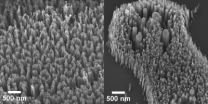(Press-News.org) The psychological impact of natural disasters such as the Japan earthquake can be revealed in the way people inherently respond to unpredictable situations, according to a psychology expert at Queen Mary, University of London.
Dr Magda Osman, Psychology Lecturer at Queen Mary, University of London, and author of Controlling Uncertainty: Decision-making and Learning in Complex Worlds, said the disaster had a devastating immediate effect on tens of thousands of people in Japan but the true psychological impact will be felt "for some time to come".
"A disaster like the Japan earthquake has such wide-ranging implications, especially on the psychological well-being of those affected," Dr Osman said.
"After a disaster, typically small communities become incredibly co-operative and pull together to help each other and start the rebuilding process. There's an immediate response where people start to take control of the situation, begin to deal with it and assess and respond to the devastation around them.
"The problem is that we aren't very good at calculating the long-term effects of disasters. After about two months of re-building and cleaning up we tend to experience a second major slump when we realise the full severity of the situation in the longer term. This is what we need to be wary of because this triggers severe depression."
Dr Osman, who works in Queen Mary's School of Biological and Chemical Sciences, said as soon as there is a disaster, there is often a rapid increase of mental health problems in the people who have been affected. This is because natural disasters threaten our sense of control in the world.
"Our sense of control is like a mental engine, it's like an adaptive driving force that helps us stay motivated. When bad, unpredictable events happen we don't feel we have any effect over anything and this is when we start to lose self esteem," she said.
People who live in areas which are prone to disasters such as in Japan are often prepared through simulation exercises. The importance of this is not only to rehearse what to do in the event of a disaster, but also to increase our sense of control over the situation. This is can be a powerful way to create resilience, according to Dr Osman.
The lab experiments Dr Osman has conducted show that even when a situation is unpredictable and seems to be spiralling out of control, and when people are encouraged to believe they have control over the situation, they tend to be better able to exert control. She said: "Ironically, the illusion of control can actually help to generate a real sense of control."
"Setting goals is the best way of helping to exert or take back control. Working towards goals helps us to gain a lot of information about a situation. Goals act like a yardstick to compare future events against. This helps to reduce our feelings of insecurity because it gives us a way of interpreting the good and bad experiences that happen.
"Evidence from the lab suggests that we don't always do what is best to gain information and gain control in the long term; typically we overreact to massive changes, when the best thing to do is be steadfast."
INFORMATION:
To arrange an interview with Dr Osman please contact:
Bridget Dempsey, Communications Manager
Queen Mary, University of London
E: b.dempsey@qmul.ac.uk or T: 020 7882 7454
Notes to editors:
Dr Magda Osman's book Controlling Uncertainty: Decision-making and Learning in Complex Worlds is published by Wiley-Blackwell in 2010.
Queen Mary, University of London
Queen Mary, University of London is one of the UK's leading research-focused higher education institutions with some 15,000 undergraduate and postgraduate students.
Amongst the largest of the colleges of the University of London, Queen Mary's 3,000 staff deliver world class degree programmes and research across 21 academic departments and institutes, within three sectors: Science and Engineering; Humanities, Social Sciences and Laws; and the School of Medicine and Dentistry.
Queen Mary is ranked 11th in the UK according to the Guardian analysis of the 2008 Research Assessment Exercise, and has been described as 'the biggest star among the research-intensive institutions' by the Times Higher Education.
The College has a strong international reputation, with around 20 per cent of students coming from over 100 countries.
Queen Mary has an annual turnover of £220 million, research income worth £61 million, and generates employment and output worth £600 million to the UK economy each year.
Queen Mary, as a member of the 1994 Group of research-focused universities, has made a strategic commitment to the highest quality of research, but also to the best possible educational, cultural and social experience for its students. The College is unique amongst London's universities in being able to offer a completely integrated residential campus, with a 2,000-bed award-winning Student Village on its Mile End campus.
END
A new plant species is providing an insight into how evolution works and could help improve crop plants, scientists have revealed.
The new plant species, Tragopogon miscellus, appeared in the United States 80 years ago. It came about when two species in the daisy family, introduced from Europe, mated to produce a hybrid offspring.
The species had mated before in Europe, but the hybrids were never successful. However in America something new happened. The number of chromosomes in the hybrid spontaneously doubled, and at once it became larger than its parents and quickly ...
eMaint Enterprises, headquartered in Marlton, New Jersey has provided maintenance management software solutions since 1986. Dedicated to successful CMMS implementation, eMaint is pleased to be a contributing sponsor of the CMMS-2011 Computerized Maintenance Management Summit, a learning and networking event designed for those seeking to implement a new CMMS/EAM or reimplement an existing CMMS/EAM for more effective maintenance management and decision support. The Summit will take place at the Reliability Performance Institute in Fort Myers, Florida on April 11 - 13, 2011.
eMaint's ...
A study by the Complutense University of Madrid (UCM), analysing the impact of the labour reforms introduced over the past 30 years and the living conditions of new generations, asserts that these reforms have been the origin and cause of the current development model based on the exploitation of young people.
"The study indicates that the Spanish economic development model over the past three decades – with high rates of economic growth and job creation – is based on the 'over-exploitation of the youngest generations of workers'", Pablo López Calle, author of the paper, ...
The tendency to perceive others as "us versus them" isn't exclusively human but appears to be shared by our primate cousins, a new study led by Yale researchers has found.
In a series of ingenious experiments, Yale researchers led by psychologist Laurie Santos showed that monkeys treat individuals from outside their groups with the same suspicion and dislike as their human cousins tend to treat outsiders, suggesting that the roots of human intergroup conflict may be evolutionarily quite ancient.
The findings are reported in the March issue of the Journal of Personality ...
Carbon nanofibers hold promise for technologies ranging from medical imaging devices to precise scientific measurement tools, but the time and expense associated with uniformly creating nanofibers of the correct size has been an obstacle – until now. A new study from North Carolina State University demonstrates an improved method for creating carbon nanofibers of specific sizes, as well as explaining the science behind the method.
"Carbon nanofibers have a host of potential applications, but their utility is affected by their diameter – and controlling the diameter of ...
Badbeat.com, the original and leading online poker staking business, will be donating 10% of ALL affiliate revenue generated by the Badbeat players on Friday 18th March to Comic Relief in support of Red Nose Day.
The Badbeat management has urged their players to help change lives both in the UK and across Africa, challenging them to raise as much money as possible playing poker day and night!
"Red Nose Day is a day like no other; when the whole country gets together to help change countless lives," said Badbeat Managing Director, John Conroy. "We're incredibly happy ...
MIAMI – March 17, 2010 -- University of Miami (UM) Rosenstiel School of Marine & Atmospheric Science scientist Chris Langdon and colleagues developed a new tool to monitor coral reef vital signs. By accurately measuring their biological pulse, scientists can better assess how climate change and other ecological threats impact coral reef health worldwide.
During a March 2009 experiment at Cayo Enrique Reef in Puerto Rico, the team tested two new methods to monitor biological productivity. They compared a technique that measures changes in dissolved oxygen within ...
Using skin cells from adult siblings with schizophrenia and a genetic mutation linked to major mental illnesses, Johns Hopkins researchers have created induced pluripotent stem cells (iPS cells) using a new and improved "clean" technique.
Reporting online February 22 in Molecular Psychiatry, the team confirms the establishment of two new lines of iPS cells with mutations in the gene named Disrupted In Schizophrenia 1, or DISC1. They made the cells using a nonviral "epiosomal vector" that jumpstarts the reprogramming machinery of cells without modifying their original ...
Researchers at the University of Granada have proved that neuropsychological rehabilitation helps in significantly reducing cognitive, emotional and behavioural after-effects in patients with acquired brain injury, generaly due to traumatic brain injury and ictus. These patients should not wait to be treated later by the social services, since early intervention (within six months after the traumatism) reduces further after-effects.
Despite the prevention campaigns launched for reducing traffic accidents and improving heart-friendly habits, traumatic brain injury and ...
A pilot study in healthy children and adolescents shows that it is feasible to screen for undiagnosed heart conditions that increase the risk of sudden cardiac arrest (SCA). Adding a 10-minute electrocardiogram (EKG or ECG) to a history and physical examination identified unsuspected cases of potentially serious heart conditions.
Although more research is needed, the preliminary results suggest that a relatively low-cost screening might help identify children who are at risk for sudden cardiac arrest, possibly preventing childhood death.
"In the United States, the ...




